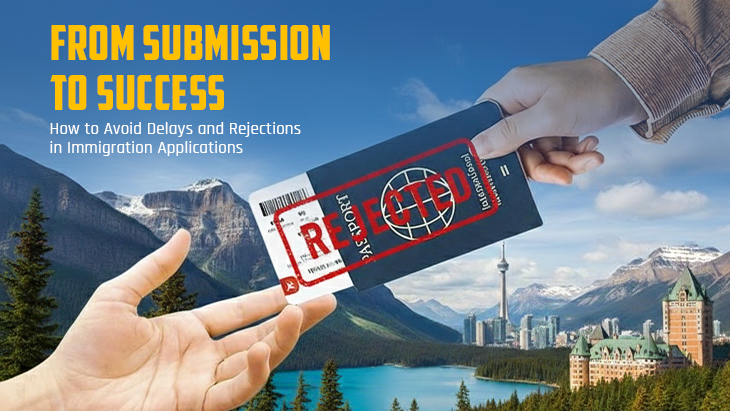You may be criminally ineligible to Canada if you have been arrested or convicted of Driving Under the Influence of Alcohol (DUI). This may impair your capacity to visit Canada and may preclude your eligibility for all Canadian immigration programmes. Even a dependent or accompanying family member's criminal inadmissibility due to DUI might have serious consequences.
Entering into Canada with something like a DUI is unfortunately not as straightforward as turning up en masse at the border with a valid US passport. You may be criminally ineligible to Canada and barred from entering if you've ever been prosecuted or guilty of traveling under the influence of alcohol or drugs, whether there was a misdemeanor or felony violation. At the Canadian border, there is no presumption of innocence, thus even a DUI charge undergoing prosecution can result in a denial.
How to Get Approval to Enter Canada if You Have a DUI?
To overcome criminal unconstitutionality to Canada, an individual must first apply for and then acquire permission to visit the nation from Canadian authorities. Obtaining such permission to visit Canada via Canadian Visa or otherwise is a complicated legal process that can easily overwhelm someone who does not have professional help. However, depending on the circumstances, criminal disqualification to Canada due to DUI, DWI, or really any driving while intoxicated conviction(s) can be overcome in a variety of ways.
1. TemporaryAlternative:
A Temporary Resident Permit (TRP) is an agreement that allows someone who is unable to enter Canada for a specific length of time to briefly visit the country. A TRP should only be requested for legitimate reason, since it is not commonly used to gain entrance to Canada for recreational purposes. The decision to give a TRP to avoid a DUI conviction ultimately lies with the Canadian immigration officer who evaluates the application. A TRP may be a viable approach to DUI inadmissibility for those who are not yet qualified for Criminal Rehabilitation.
* A Temporary Resident Permit in Canada might be valid for up to three years, based on the criteria of the application. The application process for a Temporary Resident Permit is subjective, thus serious applicants should seek legal advice from a Canadian immigration professional before proceeding.
* Individuals should mail their TRP applications to a recognised Canadian consulate for processing, according to Citizenship and Immigration Canada (via Canadian Visa). In some cases, however, a Temporary Resident Permit may be requested from Canadian immigration officials at a border checkpoint (seaport, border crossing or airport).
2. PermanentAlternative:
The second alternative is to apply for Criminal Rehabilitation (CR), that is an administrative process in which a person requests Canada immigration officials to pardon a prior DUI conviction permanently. To be eligible for Criminal Rehab, the sentence must have been fully completed for five years, including payment of penalties, volunteerism, education, rehabilitation, and just about any other conditions imposed by the court.
* Completing the Rehabilitation procedure gives a person a fresh start and may allow them to re-enter Canada without restriction. Criminal Rehabilitation, unlike a Temporary Resident Permit, that is only valid for a set period of time, does not need to be renewed and can grant permanent entrance to Canada.
* Whether traveling for business or leisure, qualified individuals will appreciate the peace and quiet and simplicity of being able to visit Canada at any time without the very fear of being denied entrance due to a DUI.
3. Deemed Rehabilitation:
After being guilty of a single DUI, an offender may well be Deemed Rehabilitated in some cases. For instance, if all sentences, penalties, and rehabilitation terms, as well as some other essential criteria, have been completed for ten years, the Canadian immigration officials may overlook a prior drunk-driving conviction.
If an American has only one conviction that is not regarded as a severe felony in Canada and enough time has gone since all sentences, including any probation, an American may well be "deemed rehabilitated." However, a DUI is a serious criminal in Canada as of December 2018, and such an act no longer qualifies for Deemed Rehabilitation after a decade.
Because impaired driving is now a major felony in Canada, any American with a prior criteria of sloppy recklessness, or any drunk driving arrest or conviction should consult a specialist regarding their eligibility prior to attempting to enter the country. If you already have two or more driving under the influence violations or other intangible criminal convictions on your record, you will almost certainly never be considered rehabilitated by time, and you may be denied entry to Canada without a Temporary Resident Permit or Criminal Rehabilitation, even if it has been 20 years or more.
To increase your chances of entering Canada with a DUI, speak with a professionally experienced Canadian immigration lawyer who will guide you through the measures you need to follow before and throughout your application to ensure you have the best chance of being granted.














Post Comments